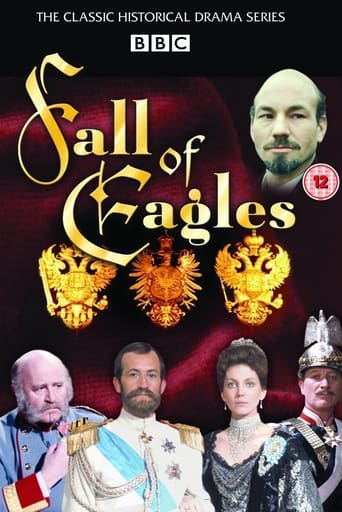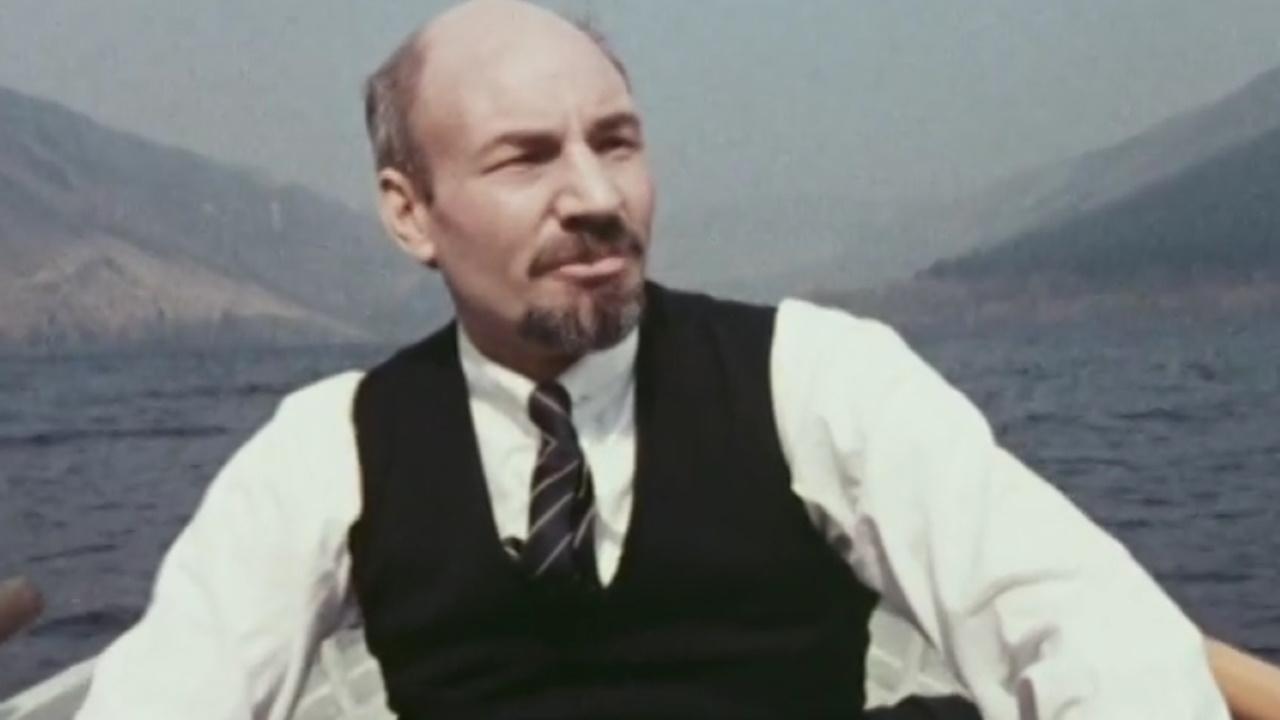

"Fall of Eagles" is a 13-part British television drama aired by the BBC in 1974. The series portrays historical events from 1848 to 1918, dealing with the collapse of the ruling dynasties of Austria-Hungary (the Habsburgs), Germany (the Hohenzollerns) and Russia (the Romanovs).
 AD
AD
All Prime Video
Cancel anytime


With Franz Joseph now dead and the Romanovs murdered by the Bolsheviks, Kaiser Wilhelm is the lone eagle still standing. German troops move west from the now peaceful Russian front, but the Spring Offensive fails, with the Allies making surprising advances across France and Belgium. Wilhelm’s optimism of his soldier’s fighting will is not fully shared by the General Staff, particularly because of the desperate erosion of the home front. Wilhelm’s cousin Prince Max is made Chancellor as a concession to reform, but that only hastens the clamour for change. The 1918 German revolution finally forces the Kaiser’s abdication, and he flees to exile in the Netherlands.

As the war continues, Kaiser Wilhelm, tiring from his responsibilities, allows Ludendorff, Hindenburg, Admiral von Holtzendorff and Bethmann-Hollweg to propose riskier strategies for ‘total victory’ (such as unrestricted submarine warfare against neutral shipping). With Rasputin now dead, Alexander Kerensky incites open revolt in the Duma, who support his insistence on the abdication of the Tsar. The Kaiser, fearful of creating a “Bolshevik nemesis”, reluctantly allows Lenin and his compatriots to travel through Germany from exile in Switzerland. With the help of industrialist Dr Helphand, the Russians finally arrive to a heroic homecoming in St Petersburg.

With the resolve and the morale of the Russian army plummeting, Nicholas decides to leave the capital to take personal command of the army, leaving Alexandra behind as his eyes and ears in Petrograd. His son Alexei soon joins him, but his frail constitution soon leads to another health scare. Alexandra, becoming increasingly unpopular and insecure, has come to rely heavily on the advice and cures of faith healer Grigori Rasputin, who also advises the Empress on which religious people should be in government. As a result, Alexander Protopopov is appointed as a minister, but his ineptitude leads other politicians, such as Mikhail Rodzianko and Alexander Trepov, to scheme for change.

Franz Josef fears for Austria-Hungary’s future in the hands of his reform-minded nephew and heir-presumptive Franz Ferdinand, especially because of the time that he spends with Kaiser Wilhelm. However, he soon gets news of the assassination of Franz Ferdinand and his lower-ranked wife, Sophie Chotek, in Sarajevo. Initially, he accepts the “providence” of the event and refuses calls to mobilise the army and to punish Serbia. However, the Kaiser quickly insists on immediate and decisive action against Serbia, dismissing the preparedness and will of Russia, downplaying the military threat from France and setting a chain of events in motion that leads to the outbreak of the First World War.

Britain’s King Edward VII makes a visit to the Royal Russian yacht to discuss an alliance with Russia. Meanwhile, Russia’s Foreign Minister Alexander Izvolsky, begins intriguing to have the Bosphorus opened to the Black Sea Fleet, preferring access to the Dardanelles over guaranteeing Serbian sovereignty against Austria in the Balkans. He quickly finds himself outplayed by Alois Lexa von Aehrenthal when Austria rapidly annexes the Turkish territory of Bosnia and Herzegovina, precipitating the Bosnian crisis. In its wake and with the sting of the loss to Japan still fresh, Russia is again outwitted and embarrassed by diplomatic intrigues and forces beyond its borders.

When Grand Duke Sergei is murdered, Nicholas dismisses his police chief and considers Pyotr Rachkovsky as a suitable replacement even though he seems untrustworthy and is rumoured to use agent provocateurs. Both Sergei Witte and Empress Alexandra also have grave concerns about him and his methods but for different reasons. Nevertheless, with unrest fermenting and the memory of Bloody Sunday still fresh, he is appointed after seeking additional authority from the Tsar. Nicholas grants some concessions, including the creation of the Duma, as Rachkovsky begins using his forces in a deadly purge of troublemakers and revolutionaries in St Petersburg and beyond.

Nicholas is preoccupied by strikes and the humiliating war with Japan; the continual unsolicited advice and gifts of his cousin, Wilhelm II; and the health of his only son Alexei, who has hemophilia. A rising tide of discontent among St Petersburg’s working class leads to the assassination of the interior minister Vyacheslav von Plehve. Police attack a demonstration led by police spy and priest Fr Georgy Gapon, killing many. Nicholas, believes that his people are still loyal and resists change. Wilhelm attempts to forge an alliance with Russia. Nicholas, considering Germany’s assistance, is willing to sign, but his ministers insist that they must first show it to France for consideration.

Nicholas has now been tsar for nine years and refuses to share his absolute authority with a parliament urged by social reformers. Now married and in London, Lenin is founding his own more radical brand of Marxism and manoeuvres to divide the Russian Social Democratic Labour Party and its publication Iskra from his primary rival Julius Martov. He befriends Leon Trotsky, and despite ill health, at the Second R.S.D.L.P. Congress, Lenin moves to consolidate control. One by one, moderates and liberals are side-lined or expelled, leaving the party split into Bolsheviks and Mensheviks. Meeting at the grave of Karl Marx, many former comrades bid him farewell.

Tsar Alexander III doubts the ability of his son and heir-apparent, Nicholas, to inherit the Russian throne. The young tsarevich is similarly apprehensive. Despite his longstanding affair with St Petersburg ballerina Mathilde Kschessinska and the disapproval of his mother over his marriage choice, he is resolved to marry Princess Alix of Hesse-Darmstadt, seemingly the suitable match. Traveling to Germany, Nicholas II is supported in this by his relatives, including his cousin Kaiser Wilhelm and Alix’s grandmother, the ageing Queen Victoria of Great Britain. Meanwhile, the autocratic conservatism of the Imperial Government has resulted in discontent among factory workers, under the ægis of the revolutionary Vladimir Lenin.

On 30 January 1889, tragedy strikes the House of Habsburg when liberal Crown Prince Rudolf of Austria-Hungary and his young mistress Baroness Mary Vetsera are found dead at the hunting lodge at Mayerling in the Vienna Woods, 24 km southwest of the capital, in an apparent murder-suicide by Rudolf. In Vienna, and at Mayerling, imperial officials contrive to hide the events of the Mayerling incident to prevent a massive public scandal, misleading the emperor and the empress about the true nature of the deaths. Rudolph’s letters and the report by Professor Widerhoffer finally reveal the truth to the royal couple. The episode, narrated in hindsight, ends with news of the assassination of the Empress in 1898 in Geneva.

With Germany united under Prussia, Bismarck seeks a stabilizing alliance with the Austrians and Russians through the League of the Three Emperors. His plans extend to influencing the Kaiser’s grandson Wilhelm. In 1888, Wilhelm I and his successor Frederick III, both die (the Year of the Three Emperors). Kaiser Wilhelm II rapidly assumes the throne; Bismarck is forced to resign when his policies and political style clash with those of the young emperor. The ageing chancellor seeks support from Vicky, but she spurns him and blames his meddling for her estrangement from her son.

In the hope of promoting a liberal and united Germany, Queen Victoria and Prince Albert arrange for their eldest daughter Victoria ‘Vicky’ to marry Prince Frederick ‘Fritz’ of the Kingdom of Prussia. However, despite her love for the heir apparent and their growing family, the British princess is unprepared for the constraints of her new life in Berlin. Her politically liberal views and her influence over her husband clash with those of Otto von Bismarck and the Prussian doctrine of iron and blood. Bismarck wins influence over the Kaiser and surprises Europe with swift victories during the decisive Austro-Prussian War and Franco-Prussian War.

Franz Josef has been Austrian emperor since 1848, yet he remains unmarried five years into his reign. His mother, Archduchess Sophie, is determined to ensure the Habsburg line and favours her niece Helene as the future empress. However, Franz has other ideas and prefers Helene’s 15-year-old sister Elisabeth, whom he marries. She struggles to deal with her new position as empress of Austria, motherhood, and her domineering mother-in-law. Endeavouring to carve some of her own space, she resumes a friendship with her old Hungarian mentor Count Majlath. Her fixation with his country is unwelcome at the court.
"Fall of Eagles" is a 13-part British television drama aired by the BBC in 1974. The series portrays historical events from 1848 to 1918, dealing with the collapse of the ruling dynasties of Austria-Hungary (the Habsburgs), Germany (the Hohenzollerns) and Russia (the Romanovs).
The tv show is currently not available onine